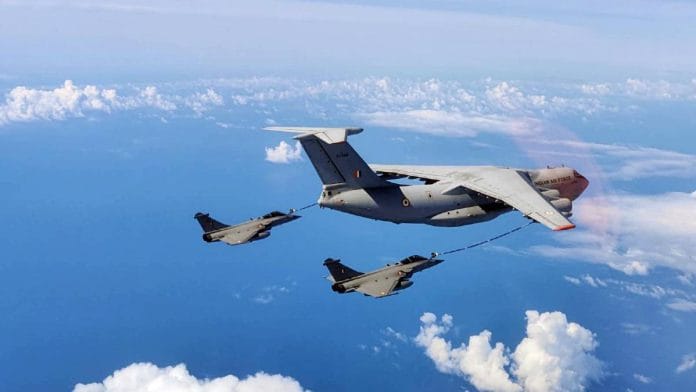New Delhi: Amid escalating tensions with Pakistan in the wake of the Pahalgam attack, the Indian Air Force (IAF) initiated the exercise ‘Aakraman’ (meaning “attack”) Thursday.
The extensive, multi-role military exercise is taking place in the central sector and involves the deployment of frontline fighter fleets, prominently led by the Rafale and Su-30MKI squadrons.
Sources in the defence and security establishment told ThePrint that IAF assets from Ambala and Hasimara, home to India’s two Rafale squadrons as well as aircraft redeployed from eastern bases, are participating in the exercise.
Speaking to ThePrint, an IAF official said “the exercise is part of routine preparedness drills”, but its timing—soon after Tuesday’s terror attack—has sparked public and strategic interest.
“Top pilots have been flown in and every sortie is being overseen by highly experienced weapons instructors, ensuring that the servicemen master both day-and-night operations,” said the official.
“The Rafales and Su-30MKIs are carrying out precision ground-attack missions alongside advanced electronic warfare drills,” he added. “The exercise also involves MiG-21s, the S-400 air defence system, AWACS (airborne warning and control system), mid-air refuellers and Garud commandos, among others.”
The scenarios simulate assaults across diverse terrain, from open plains to high-altitude mountain passes, enabling pilots to refine tactics in realistic settings.
Earlier in the day, the Indian Navy demonstrated its operational readiness as the guided-missile destroyer INS Surat successfully conducted the test firing of a Medium-Range Surface-to-Air Missile (MR-SAM) in the Arabian Sea.
The timing of the test is significant, particularly as Pakistan Wednesday issued a NOTAM (Notice to Airmen/Mariners) for the Arabian Sea, specifying coordinates near its waters for 24 and 25 April. The action appears to be in anticipation of a potential military response from India following the Pahalgam attack.
At 9.30 pm Wednesday, Pakistan had also issued a maritime warning, indicating an anticipated missile test within its Exclusive Economic Zone near Karachi, as India’s senior leadership met under the framework of the cabinet committee on security and suspended the Indus Waters Treaty, among other measures directed against the neighbouring nation.
Pakistan took substantial measures Thursday, including the closure of its airspace to Indian aircraft, the cessation of all bilateral agreements and economic exchanges, and characterised India’s suspension of the Indus Waters Treaty as an “act of war”.
During a rally in Bihar the same day, Prime Minister Narendra Modi spoke of the attack in Kashmir in which 26 tourists were shot dead by seven terrorists, including Pakistani nationals.
“Today, from the soil of Bihar, I say this to the whole world, India will identify, trace and punish every terrorist and their backers. We will pursue them to the ends of the Earth,” he said.
The terrorists are believed to be affiliated with the Pakistan-based Lashkar-e-Taiba (LeT). The assailants, equipped with body cameras and AK-47 rifles loaded with steel-tipped ammunition, unleashed gunfire, singling out male Hindu tourists.
(Edited by Nida Fatima Siddiqui)
Also Read: Army chief in Kashmir, ops intensified with search on for 7 LeT terrorists






